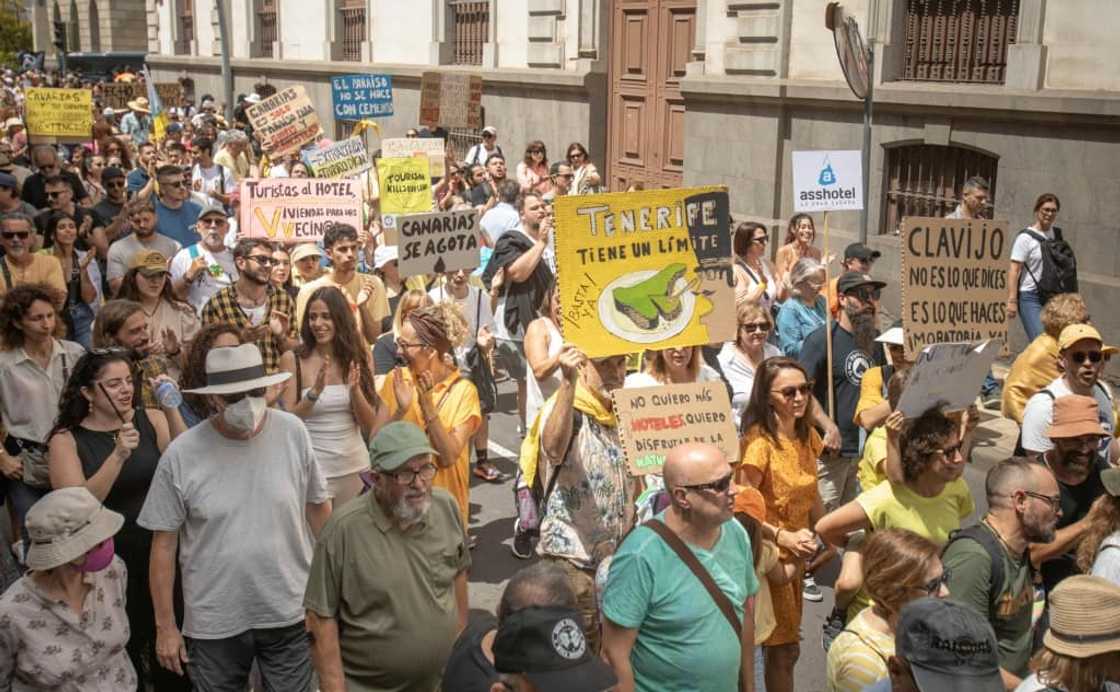Mass protests in Canary Islands decry overtourism

Source: AFP
Tens of thousands of demonstrators hit the streets across Spain's Canary Islands on Saturday to demand changes to the model of mass tourism they say is overwhelming the Atlantic archipelago.
Rallying under the slogan "The Canary Islands have a limit", demonstrators began rallying at midday (1100 GMT), flag-waving crowds packing the streets of the main towns across all of the archipelago's seven islands.
Chanting and whistling, they waved scores of placards and banners emblazoned with slogans reading: "The Canary Islands are not up for sale!" or "A moratorium on tourism" while others simply said: "Respect my home".
Organisers say mass tourism perpetuates an economic model that harms local residents and are demanding the authorities limit the numbers.
Police said 20,000 demonstrators had turned out for the demonstrations, but organisers put the figure closer to 50,000, Spain's public television said.
"We are not against tourism," one woman demonstrator called Rosario Correo told Spain's TVE public television.
PAY ATTENTION: Watch the hottest celebrity stories on our YouTube channel 'Briefly TV'. Subscribe now!
"We're asking that they change this model that allows for unlimited growth of tourism."
They are calling for a halt to the work on two new hotels on Tenerife, the largest and most developed of the archipelago's seven islands.
And they also want residents to be given a greater say in what they see as uncontrolled development which is harming the environment.
"The government and the islands' regional leaders must stop this corrupt model of never-ending growth which is based on the destruction of the environment and which only weakens the economy," said another demonstrator called Alfonso Boullon.
Protesters also gathered in Madrid and Barcelona to show their support for the rallies in the Canary Islands, public television said.
Anti-tourism protests have multiplied in recent months across Spain, the world's second-most visited country, prompting authorities to try to reconcile the interests of locals and a lucrative sector that accounts for 12.8 percent of Spain's economy.
The islands, which lie off the northwestern coast of Africa, are known for their volcanic landscapes and year-round sunshine attracting millions of visitors every year.
Some four out of 10 residents work in tourism which accounts for 36 percent of the islands' GDP, official figures show.
Last week, several members of the "Canaries Sold Out" collective also began an "indefinite" hunger strike to put pressure of the authorities.
Last year, some 16 million people visited the Canary Islands, more than seven times its population of some 2.2 million, which the collective says is unsustainable for the archipelago's limited resources.
Before the pandemic brought the global travel industry to its knees in 2020, protest movements against overtourism were already active in Spain, notably in Barcelona.
After those travel restrictions were lifted, tourism surged with Spain welcoming a record 85.1 million visitors last year.
PAY ATTENTION: Сheck out news that is picked exactly for YOU - click on “Recommended for you” and enjoy!
Source: AFP



